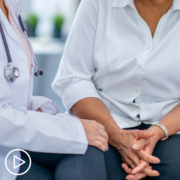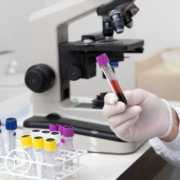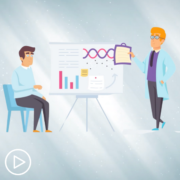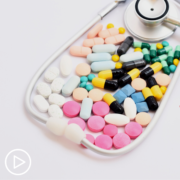Why Should DLBCL Patients Engage in Their Care?
Why Should DLBCL Patients Engage in Their Care? from Patient Empowerment Network on Vimeo.
DLBCL expert Dr. Jane Winter explains the benefits of being an engaged and empowered patient and shares key questions for patients to ask their doctors.
Dr. Jane Winter is a hematologist and medical oncologist at Robert H. Lurie Comprehensive Cancer Center at Northwestern University. More information on Dr. Winter here.
See More From The Pro-Active DLBCL Patient Toolkit
Related Programs:

|

|

|
Transcript:
Laura Beth:
Dr. Winter, why do you think it’s important for patients to be empowered in their DLBCL care?
Dr. Winter:
You know, a patient who is, I like the word “engaged” as well as “empowered.” I think it’s important for patients to be empowered or engaged because medicine is very complicated and very fragmented these days.
Now, it’s so difficult to be a patient and to be sick and not be able to really take control. So, patients need to be empowered and they need partners, advocates. It’s a very sad comment on our healthcare system, but to be sure that things don’t slip through the cracks, we, the providers, the hematologist, our job is tough, but we need a patient to partner with us.
So, for example, if you’re a patient with diffuse large B-cell lymphoma as your diagnosis, make sure to ask, “Was there a result for the FISH?” You need to make sure that doesn’t slip through the cracks. Or, if you are going for a second opinion or going to another medical center, make sure you have your records. I really wish that every patient who had a scan of one kind or another as they walked out the door got a copy of that scan, a disc. Now, that would make life so much simpler. But, make sure that you keep your own records. It’s hard and hopefully, every sick individual has a family member or a friend, someone who’s going to help them with this because this is very tough.
But, ask questions. “Are there clinical trials I might be eligible for? Are there alternatives to the therapy you’re recommending?” These are all important questions to ask. Don’t be afraid to say, “With this treatment, what is the likelihood that my disease is going to come under control and be cured?” I think you need to know that. And, “Is there a difference between this treatment and that treatment?” Do we know? Oftentimes, we don’t have the answer for the newer treatments, but we’re hopeful.
I just want to underscore the existence of a growing number of clinical trials that patients need to consider and think about. It’s hard at the time of the new diagnosis to be struck with not only the emotional impact of a new diagnosis and so on and not feel well and so on, but just ask the question. “Are there clinical trials I might consider?” So, that’s important, and also have optimism because the vast majority of patients, we do amazing, amazing things, and that’s why it’s so much fun to be a hematologist right now is that we have so many new and exciting treatments. And what’s more exciting than to make someone healthy again?
So, these are exciting times.










